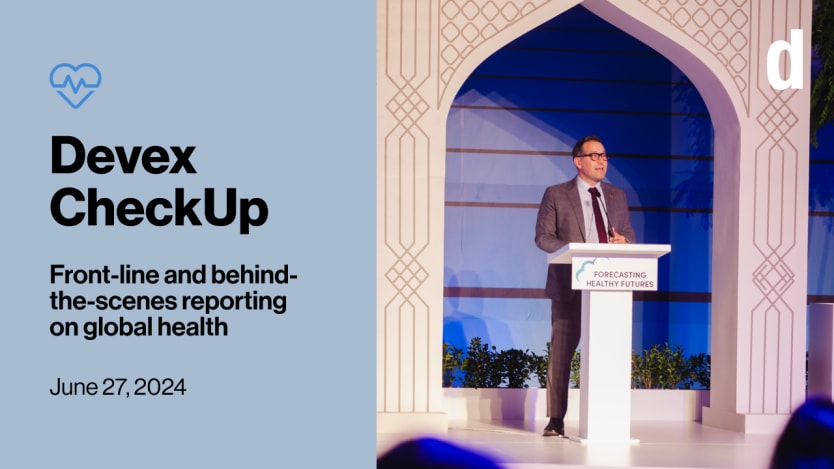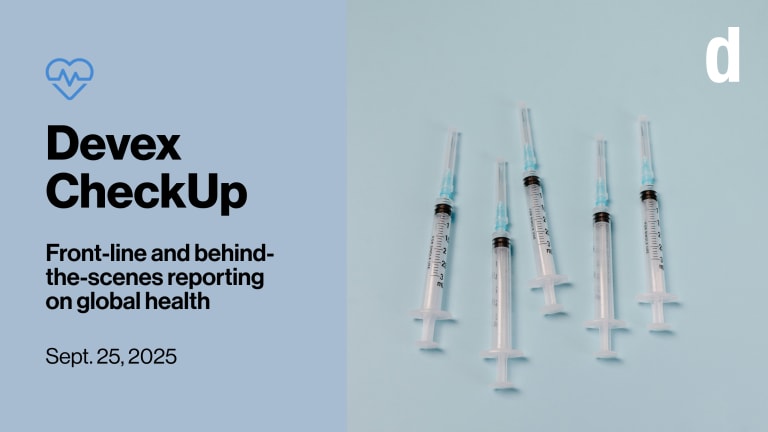
The impacts of climate change on human health have become too staggering to ignore.
Think of the “apocalyptic” flash flooding in Pakistan in 2022 that killed more than 1,700 people. Of the more than 1,300 people who died in the extreme heat of this year’s Hajj. Or of the explosive rise of dengue, which has emerged as the poster child for climate’s impact on health. Over the past two decades, there’s been a tenfold increase in cases of dengue globally as the mosquitoes that transmit the disease expand their reach to warming areas, including countries such as Afghanistan and Chad where dengue had never before been reported.
This is a preview of Devex CheckUp
Sign up to this weekly newsletter for exclusive global health news and insider insights in your inbox every Thursday.
World leaders seemed to finally wake up to the threat that climate change poses to people’s health at last year’s COP 28 U.N. climate conference in Dubai, where health had a prominent role on the agenda. But at the Forecasting Healthy Futures summit last week in Baku, Azerbaijan, my colleague Sara Jerving reports that there are some concerns about whether the momentum that came out of Dubai will translate into actual investments and activities on the ground that will improve people’s lives.
The worries are warranted. While the world spent almost $1.3 trillion in annual climate investments in 2021-2022, only 2% of adaptation funding and 0.5% of multilateral climate funding are going to projects that protect or improve health. Meanwhile, low- and middle-income countries need an estimated $11 billion annually to adapt to climate’s impact on health.
To fill those gaps and help turn the commitments in Dubai to actual investments, participants at the Baku summit are looking for greater integration of health ministries into the climate conversation. They are also pushing for changes to the funding landscape that will make it easier for health players to access climate financing. In one promising move, the Global Fund launched partnerships last year with both the Green Climate Fund and the World Bank to make it easier to coordinate health and climate investments.
Experts are looking for more in this vein, though they’re not so certain additional commitments and strategies will be as forthcoming at COP 29, which will also be hosted in Baku in November. Health is not expected to feature as prominently, even as crises such as record-breaking dengue infections in Latin America and the Caribbean highlight how much more attention needs to be paid.
Read: What’s next for the climate and health agenda?
Also: Dengue, the "poster child" for climate change's impacts on health
Say it ain’t so
Hundreds of organizations and individuals are pushing back on the move by Médecins Sans Frontières to shutter its Access Campaign, including members of the humanitarian medical organization’s own staff.
Launched in 1999, the campaign has been at the forefront of global efforts to expand access to or bring down the prices of crucial medicines, including treatment for HIV and, more recently, the tuberculosis drug bedaquiline.
Last week, the 35 current members of the Access Campaign received word that they would be laid off and that the unit would close by the end of 2024. In its place, MSF is building an Access to Products for Healthcare unit, which will broaden MSF’s access work to include other activities such as conducting operational research.
But outside organizations are rallying in support of the Access Campaign, as are some MSF members, who sent a letter to management pointing out the “lack of clear and justified rationale” for dismantling the unit. At the very least, they called for MSF leaders to hold off until the plans for the new structure are clearer.
Read: Hundreds decry closure of MSF unit that advocates for medical access
Going up
Donor spending on sexual and reproductive health and rights can have big health impacts, measured in better outcomes for mothers and reduced sexually transmitted infections. And the implications extend beyond health, affording women and girls more time to pursue education and jobs.
So it’s good news that disbursements for SRHR climbed slightly in 2022 to $14.2 billion, up from $12.7 billion the previous year, according to a new report from Deutsche Stiftung Weltevölkerung, or DSW, an organization focusing on the health needs of younger generations.
And it’s not just SRHR funding. Donor money for family planning also climbed to $1.9 billion in 2022, up from $1.8 billion in 2021. However, disbursements for reproductive, maternal, neonatal, and child health fell significantly in the same period — from $18.1 billion to $14.7 billion. DSW blamed the fall off on donors focusing instead on humanitarian aid and in-country donor refugee costs.
Read: How donors spend on sexual and reproductive health and rights (Pro)
+ If you’ve been considering signing up for Devex Pro, now is your chance! For a limited time we’re offering $100 off on an annual Devex Pro membership. Sign up this week to access exclusive events, insider articles, in-depth reports, and much more for a full year. Get your discount.
Zeroing in
0
—That’s the number of women and adolescent girls who acquired HIV in a trial of Gilead’s twice-yearly injectable lenacapavir. Researchers were testing the efficacy of the drug as prevention among 2,134 women and adolescent girls in South Africa and Uganda. The astonishing finding of 100% efficacy has increased global demand for the injectable to be included among the suite of prevention methods, known as preexposure prophylaxis, or PrEP.
many of those options take the form of once-daily pills. In the trial, researchers were comparing the efficacy of lenacapavir to two daily oral PrEP options: Descovy and Truvada. Neither was anywhere near as effective as the jab, in part because of the stigma women can face for taking oral PrEP.
Of course, the next key question is how quickly — and affordably — lenacapavir can reach the communities that might benefit from it the most across the global south. Gilead has announced that it is currently developing a strategy “to enable broad, sustainable access globally,” particularly in countries with high HIV incidence but limited resources. That could look like offering a dedicated supply of the drug to those countries until voluntary licenses can be struck, allowing for companies to manufacture affordable, generic versions of the jab.
Read: HIV trial shows injectable prevents 100% infection in women and girls
ICYMI: HIV prevention drug uptake is slow. Can offering choices change that?
More than words
Controlling the current outbreak of bird flu centered in the United States — and the all-but-certain future outbreaks of the disease — is going to require more than a veterinary response, experts say.
They are calling for a “One Health” approach, which recognizes that environmental, animal, and human health are all interlinked and contribute to the spread of bird flu and other illnesses.
Your next job?
Director of Finance and Operations
Global Health Corps
USA (remote position)
“The concept of one health had become the global slogan during the first round of [avian flu] outbreaks in the early 2000s. But we haven’t really managed to nail down the implementation, what does it mean, and how do we deal with that significant resource inequity,” Robyn Alders, a veterinarian and one health expert at the Australian National University, tells me.
But to control or rapidly respond to the spread of bird flu requires stricter surveillance and quick alerts across wildlife, animal, and human sectors. And that will mean investments, particularly in countries in the global south where resources for animal and environmental health are limited.
Read: Bird flu outbreak highlights risks to global food security
+ To keep up to date with the race to remake a more equitable and sustainable global food system, sign up to Devex Dish, a free, weekly newsletter.
What we’re reading
Almost half a million people in Gaza face starvation, global food experts are warning, and the entire region remains at risk of famine, though the amount of food reaching the northern region has increased in recent months. [The New York Times]
Of the 2.6 million deaths attributed to alcohol consumption annually, WHO reports that 2 million are men. Based on 2019 data, it estimates 400 million people were living with alcohol and drug use disorders globally. [WHO]
At least 1.57 billion items of personal protective equipment purchased by the British government during the COVID-19 pandemic, totaling about £1.4 billion ($1.77 billion) have been destroyed or written off. [BBC]








